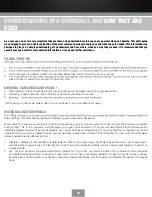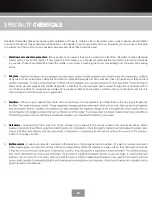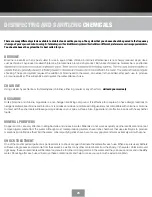
23
As a new spa owner, it is very important that you learn and understand how to keep your spa water clean and healthy. This short guide
was designed to give you a basic explanation of the most common chemicals used in spas and when they are needed. This information was
designed to give you a simple understanding of spa chemicals and how, where, when and why they are used. It is recommended that you
consult your spa dealer for more detailed information or if you need further assistance.
FILLING YOUR SPA
1.
2.
hose to remove precipitated metals from the water before they have a chance to get into your spa.
3.
lines and make it easier for your pump to prime and start.
CHEMICAL CATEGORIES AND USAGE *
1. Water balance: These chemicals protect your spa and prevent damages caused by aggressive water.
2. Sanitizing : These chemicals protect bathers by destroying bacteria and viruses.
3.
* When using any chemicals, always refer to your spa dealer’s recommendations for usage.
WATER BALANCE CHEMICALS
basic settings. This will make maintaining and balancing your water easier afterwards.
Water balance chemicals are extremely important because they prevent your spa water from becoming acidic/corrosive or alkaline/
scale forming. This, in turn, prevents costly damage to your spa and its equipment. There are four parameters that lend themselves to
determining balanced water. They include alkalinity, pH, calcium hardness and temperature. In a spa application, temperature is generally
constant and as long as it is initially in range, calcium hardness usually does not need further adjusting. The two most important water
balance parameters are alkalinity and pH.
1. Alkalinity – Alkalinity is the foundation of water balance. When in its proper range, it will help to keep the water’s pH in range and to
prevent erratic changes in the pH. Alkalinity should be checked and adjusted, initially, and then tested, and adjusted if needed, on
a weekly basis.
2. pH - pH is an extremely important water balance parameter. If pH is low, your water is acidic and can attack metal components
and heater elements resulting in corrosion to these parts. If pH is high, your water is alkaline or scale forming. As pH rises, calcium
becomes less soluble in water. pH should be checked and adjusted, initially, and then tested, and adjusted if needed, on a weekly
basis.
UNDERSTANDING SPA CHEMICALS AND
HOW THEY ARE
USED





























